Transforming healthcare with RFID, BLE, and connected technologies
Healthcare is evolving fast, and technology is right at the heart of that transformation. From reducing wait times to improving patient journeys, new tools are making care safer, smoother, and more efficient. RFID (radio frequency identification) is a key part of this shift, but it’s not working alone. Advanced technologies such as BLE (Bluetooth Low Energy), Wirepas, UWB (Ultra Wideband), and LoRa are also stepping up to solve some of the biggest challenges in healthcare today.
And while the NHS is often leading the way, healthcare providers around the world are also embracing these technologies to support staff, reduce delays, and improve outcomes.
Optimising patient flow from admission to discharge
Managing patient flow effectively - from admission to discharge - is one of the biggest operational challenges hospitals face today. Delays in movement through departments, long waits for diagnostics, and slow discharges all contribute to bottlenecks that impact both patient experience and clinical efficiency.
That’s where smart technology steps in. RFID enabled wristbands, wearable BLE sensors, and real-time dashboards are helping hospitals monitor patient movement, identify delays, and keep patient care on track.
At Perpignan Hospital in France, for example, the introduction of a BLE asset tracking solution has significantly improved the management and availability of critical medical devices such as infusion pumps and electrical beds [1]. The impact: smoother transitions, faster bed turnover, and reduced loss.

Geolocation based on triangulation of signal strength received by the anchors
Helping patients find their way
Hospitals can be disorienting - especially for those who are unwell, stressed, or visiting a loved one facing a serious illness. That’s why many hospitals are now rolling out digital wayfinding solutions. These are apps or kiosks that guide people just like a sat nav for indoors.
Wayfinding for hospitals helps reduce late or missed appointments, improves the overall experience, and takes the pressure off reception staff who would otherwise be giving directions all day.

In fact, Boston Children’s Hospital implemented a BLE-powered wayfinding app that improved patient and visitor navigation, with 65% of users reporting a better experience [2].
As technology improves, more hospitals are exploring mobile-based navigation with real-time updates, accessibility features and multilingual support.
Smarter systems for healthcare teams
Today’s connected hospital is about much more than electronic health records. RFID readers, BLE sensors and UWB systems provide live data on patient location, bed occupancy and equipment usage - empowering staff to make faster, better decisions.
With the right tools including RFID tag readers, BLE sensors, or UWB-based location systems, hospitals can make smarter decisions, work more efficiently, and focus more on what really matters: caring for people.
According to Deloitte’s 2025 Global Health Care Executive Outlook, over 70% of health system leaders worldwide are prioritising digital transformation to drive operational efficiencies and productivity gains [3].
Recent case studies show that integrated digital solutions can lead to a 35 to 45% increase in staff productivity and up to a 50% reduction in patient wait times and administrative delays [4].

A global shift in healthcare innovation
While the NHS has been early to adopt many of these technologies, they’re not unique to the UK. Hospitals in Europe, North America, Australia and across Asia are using similar tools to tackle similar problems. And it’s not just big city hospitals either - smaller facilities and clinics are getting on board too, especially as these technologies become more affordable and easier to deploy.
From patient management services to wayfinding apps for hospitals, the role of tech in healthcare is only growing. And it’s not just about efficiency - it’s about making care more human. Less time lost in queues or confusion. More time for meaningful interactions, better outcomes, and smoother experiences for everyone.
So, whether it’s RFID, BLE, UWB, or tomorrow’s innovation, tracking technologies are not just improving patient care. They are transforming how healthcare works, one innovation at a time.
RFiD Discovery’s RFID, BLE, and other tracking solutions help healthcare providers across the globe streamline processes, reduce costs, and remain competitive - all while advancing sustainable practices. Contact us to find out more.
Sources:
[1] BLE tracking helps Perpignan Hospital improve management of medical devices
[2] Internet of Things case study: Boston Children’s Hospital and smarter healthcare
[3] 2025 global health care outlook
2025 global health care outlook | Deloitte Insights
[4] Digital transformation in Healthcare [10 Case Studies ] [2025]
https://digitaldefynd.com/IQ/digital-transformation-in-healthcare-case-studies/
Using RFID technology has improved our care and provided a phenomenal return on investment by saving us hundreds of thousands of pounds and thousands of hours of nurses’ time.


